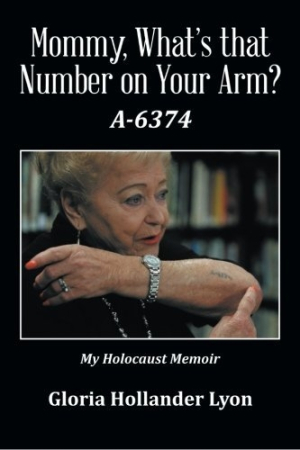Mommy, What's that Number on Your Arm?
This is the ultimate survivor’s story, relating hope despite pain and trauma.
Mommy, What’s that Number on Your Arm? by Gloria Hollander Lyon is the ultimate survivor story.
Lyon’s story begins with her childhood in a faithful Jewish family, then traces the horror of being a prisoner in seven different concentration camps. After Lyon was rescued at the end of the war, she was adopted by a Swedish family and lived with them for several years; as a teen, she began a new life in America.
While her early life story is one of loss, the stories from her adult years are ones of healing and finding her voice. Lyon began to share her experiences with her children in the 1950s; by the 1970s, she was speaking out publicly. Since then, she has spoken thousands of times, in arenas from schools to larger media appearances.
Lyon doesn’t shy away from relating the dark details of her life in concentration camps, but she also bravely shares the painful details of the process of starting a new life after the war, including finding out about all of her family members who didn’t survive, and the jarring moment in the 1970s when she received mail marked with a swastika.
This memoir gives a balanced, heartrending look at every part of Lyon’s story. With care and honesty, Lyon details surviving the horrors themselves, the challenges of personal recovery, and the ultimate resiliency of being able to share the story of her trauma. Hers is an intensely personal, vulnerable narrative, shared with deep heart and generosity both for the sake of individual readers and so that the world will learn lessons from those atrocities.
The book is also a vivid portrayal of the power of naming. Throughout her story, Lyon’s name changes: first from Zora to Hajnal when her Czechoslovakian town was taken over by Hungary; then to the dehumanizing A-6374; then to Hanci, her childhood nickname, used for survival. She chooses the name Gloria in America, and adds a married name, Lyon. Far from being mere details, these names carry the story of her identity, stolen and reclaimed.
The narrative features detailed recollections and clear descriptions. Lyon deftly balances a narrator’s detachment with the raw emotions of a child living through hellish circumstances. As a result, her pain comes through, but so too does her triumph, as well as the broader history that her personal story represents.
The book opens with lists of the names of her relatives who were murdered during the Holocaust, and closes with photos of her sons and their children and grandchildren—achieving a delicate yet powerful balance of pain and hope.
Mommy, What’s that Number on Your Arm? is a story of hope despite deep loss and trauma.
Reviewed by
Melissa Wuske
Disclosure: This article is not an endorsement, but a review. The publisher of this book provided free copies of the book and paid a small fee to have their book reviewed by a professional reviewer. Foreword Reviews and Clarion Reviews make no guarantee that the publisher will receive a positive review. Foreword Magazine, Inc. is disclosing this in accordance with the Federal Trade Commission’s 16 CFR, Part 255.

